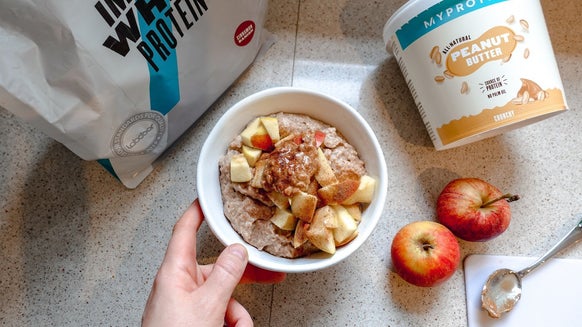
Spent all day sat on your phone, barely glancing at your emails. There's no doubt that the current working from home situation will be getting to a lot of us and meaning our productivity is well below par. To save you flushing away your career when things are crazy enough as it is, we've decided to help you get the brain boost you need to re-focus and get stuff done.
The brain
The brain is very much the “control centre” of the human body. It regulates your thoughts, emotions, behaviours, your breathing, your movements, your senses and much, much more.
It has to be dynamic and adaptive, able to manage stressors, filter stimuli, send the correct signals the right parts of the body and create and protect new and existing memories.
It’s always on the go — it’s a 24/7 job for our brain, and there’s argument to be had that it works even harder when you’re asleep.1
The work the brain carries out requires a great deal of energy, and we achieve that energy demand from the foods we eat. Just like how your car requires certain fuel to perform optimally, our brain appears to function better when we have a diet which is rich in certain things and sparser in others.
Many of us may be struggling right now with the new environment and working from home model. We can’t tell you how many times we’ve heard “I can’t concentrate” or “I’ve lost focus”. This may be down to your new behaviours and a dietary intake not built to support your brain.
For that reason, we’re going to cover exactly how what you eat directly affects the structure and function of your brain as well as your “focus”, cognitive performance and mental health.

How we concentrate and how we lose “focus”
Focusing on a task is a lot like focusing your vision. It’s essentially a top-down process. When you make the decision to focus on something, your brain first takes in all the available information and starts to process that information to tell you what you should focus on. It identifies what should take priority and acts on it.
We lose focus when there’s an overload of information or external stimuli. An example of this would be looking at your phone whilst in the gym. It’s actually a protective mechanism, designed to enhance survival, however that doesn’t quite translate to today’s society. We used to get chased by animals, but now it’s a case of surviving too few likes on a post.
So how do we improve our “focus”?
Look at it like this, focus is typically an outcome of many other factors. It’s the “tip of the iceberg” so to speak. While we can do things like remove external stimuli, isolate ourselves, have a resonating reason as to “why” we may be doing a particular task, etc. addressing the underlying contributors to reduced focus or concentration can improve it dramatically.
So, what affects focus? Well, it appears to come down to our mental health and the health of our actual brain itself.
Our mood directly affects our focus — if we’re stressed, irritable, depressed or simply “low”, tasks feel more difficult and there’s less motivation to carry them out.
Lifestyle behaviours play a key part in our mental health. Ensuring you’re getting adequate sleep, managing your stress, and getting enough exercise are all important contributors to a “kinder mind”.

How we eat affects our cognitive performance
Diet can also play a pretty significant role in improving and maintaining our mental health.
More traditional diets, like the Mediterranean diet, rich in vegetables, fruits, unprocessed grains, and fish and seafood, are associated with a healthy brain.2
This is most likely due to the balance of anti-inflammatory to pro-inflammatory foods, with traditional diets favouring anti-inflammatories significantly more.
Serotonin
Why is this important you ask? Well, that’s all down to serotonin — a neurotransmitter that helps regulate sleep and appetite, mediate moods, and inhibit pain.
About 95% of your serotonin is produced in your gut and traditional diets may not only have a protective effect against inflammation, but also improve your gut’s overall function.
These diets are rich in probiotic and prebiotic foodstuffs which our “good” gut bacteria love and thrive off of. If our gut microbiome is healthier, we tend to be performing and feeling better while generally being much healthier.
Omega-3
These diets are also rich in omega-3s polyunsaturated fatty acids (PUFAs). Omega-3s have been shown to have a protective effect on the brain and also contributing to improved cognitive performance.3
Certain supplements can also be of benefit too — for instance, 5-HTP supplementation, which is a precursor of serotonin, can increase levels of serotonin in some cases.4
Vitamin D
Vitamin D is another important consideration for boosting that brain power. Making sure you’re getting enough of it from your diet can be extremely difficult, so supplementation is advised.
A deficiency in vitamin D has been associated with cognitive decline.5 However, adequate levels appear to have the opposite effect and so may be an important part to the puzzle for solving your focus issues.
Neuroplasticity
One important topic that shouldn’t be forgotten in all of this is neuroplasticity — the brain’s ability to modify, change, and adapt both structure and function throughout life and in response to experience.
Improving neuroplasticity flexibility has been associated with significant improvements involving memory, attention, and executive-functioning.6
The dietary factors we’ve alluded to already all appear to contribute to improved neuroplasticity flexibility — even more reason to give them a try!
Take home message
It’s not too far off to say that “we are what we eat”. If what we eat shapes our brain’s ability to perform and its overall health, then we will reap the rewards (or the consequences) of our dietary behaviours.
Put away your phones, get some sleep, train, tweak your diet and watch your productivity flourish (regardless of whether you’re working in your pyjamas or not)!

1. DiNuzzo, M., & Nedergaard, M. (2017). Brain energetics during the sleep–wake cycle. Current opinion in neurobiology, 47, 65-72.
2. Munoz, M. A., Fito, M., Marrugat, J., Covas, M. I., & Schröder, H. (2008). Adherence to the Mediterranean diet is associated with better mental and physical health. British Journal of Nutrition, 101(12), 1821-1827.
3. Spencer, S. J., Korosi, A., Layé, S., Shukitt-Hale, B., & Barrientos, R. M. (2017). Food for thought: how nutrition impacts cognition and emotion. npj Science of Food, 1(1), 1-8.
4. Birdsall, T. C. (1998). 5-Hydroxytryptophan: a clinically-effective serotonin precursor. Alternative medicine review: a journal of clinical therapeutic, 3(4), 271-280.
5. Soni, M., Kos, K., Lang, I. A., Jones, K., Melzer, D., & Llewellyn, D. J. (2012). Vitamin D and cognitive function. Scandinavian Journal of Clinical and Laboratory Investigation, 72(sup243), 79-82.
6. Shaffer, J. (2016). Neuroplasticity and clinical practice: building brain power for health. Frontiers in Psychology, 7, 1118.




